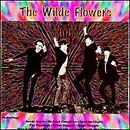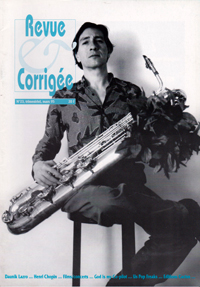| |

Tales Of Canterbury
1994
The Wilde Flowers
|
|
|
| |
FACELIFT -Issue 14 - June '95
The Wilde Flowers - Voiceprint VPB 123CD
|
|

|
This is the album we've all been waiting to hear - an album of songs which takes us back a couple of years further from even the earliest Soft Machine and Caravan recordings. For those of you not familiar with the story, The Wilde Flowers were the first 'Canterbury' band, a band of shifting lineups throughout mid to late Sixties who included future Softs members Kevin Avers, Robert Wyatt and Hugh Hopper, as well as the entire cast of Caravan. They also included Hugh's brother Brian, the only constant member in the band. And it's really Brian's story, as those who got the accompanying CD booklet will appreciate.
I'd heard some very scratchy Flowers demos on a tape a few years back, and was more curious than hopeful about the quality of material on the CD. The first surprise is that there are 22 tracks. The music I'd heard was a batch of six songs from 1965/6, and assumed that was it. In fact, far from it.
The second surprise is quite how good some of the music is. Again, I'd been hoping for little more than an interesting archive document with maybe some early versions of Soft Machine songs thrown in as a bonus. There are, in fact a vast amount of 'new' songs, whilst more familiar ones take on radically different arrangements. The album can be broken down into essentially four periods: the demos from 1965 from two bands that included Richard Sinclair, both Hoppers, Robert Wyatt and contrasting vocalists Graham Flight and Kevin Avers; a large collection from 1966 which are dominated by Robert Wyatf s voice; Brian Hopper's Zobe recordings; and a reconvening in 1969 to record demos for the Hopper brothers. Whilst the last two sessions both went under different names, they essentially involved Wilde Flowers musicians and music.
The 1965 material was largely familiar to me. Two R'n'B covers (Mose Allison's 'Parchman's Farm'; Chuck Berry's 'Almost Grown') are steady and unremarkable, maybe reflecting the Wilde Flowers likely set list at that time, but already the prolific Hugh Hopper writing machine was underway. The instrumental work through 'Memories' may not be the most striking of versions, but it shows a highly developed writing talent three years before Hugh Hopper joined the Soft Machine...
One song from '65 I hadn't heard was 'It's What I Feel', a very straight version of 'A Certain Kind', sung by a very young Richard Sinclair. Good to hear the Sinclair voice this far back, but, like 'Memories', it perhaps serves best to show quite how much Robert Wyatt had re-arranged a whole host of Flowers material by the time of Soft Machine Volume One or 'Moon In June'.
The 1966 tunes perhaps best show a band starting to find their own voice, and to these ears represent a quantum leap from the '65 band.' Richard Coughlan had joined the band on drums, leaving Robert Wyatt free to sing, and it's the combination of Hugh Hopper's writing and Robert Wyatt's voice that make it work. 'No Game When You Lose' is a stunningly simple Sixties pop tune that shows enough of the booming Hopper bass line and melancholy Wyatt to give a hint of what was to come later. 'Never Leave Me', with an unusual time signature underpinning the chorus, is another fine foretaste. We also see the Wyatt voice starting to find its range on 'Memories'.
Less memorable are the Zobe pieces, recorded in 1968 with Brian Hopper alongside Flowers singer Dave Lawrence. Interesting because they feature perhaps the most sophisticated instrumentation of the whole CD (thanks largely to Brian Hopper's sax and flute-remember that Soft Machine's 'Volume Two' was round about this era), but also the weakest vocals.
Dominating the album is the classy 1969 session, and Voiceprint, no fools, have recognised this by beginning and ending the CD with tracks from this. 'Impotence', a Hugh Hopper song, can be heard, in rougher sound, in the midst of the 1966 songs, but as track one it has enormous impact - it could be a classic Caravan tune, backed by a very familiar Pye Hastings guitar sound, but the high-ended vocals are Robert Wyatt's domain. Track 22 is, for me, the best-ever cut of 'Memories', and I can't think of a better example of the Wyatt voice. With Mike Ratledge providing some jazz piano chords not heard on any other version and Wyatt's voice at its most haunting, it has a deliciously sleazy jazzbarfeel. These 1969 songs (which also include Hugh Hopper's 'She Loves To Hurt', with fine Pye Hastings vocals and Brian Hopper's more adventurous 'The Big Show') also benefit from the best sound quality of the album and a moving rota of musicians that include the Hopper brothers, Pye Hastings, Robert Wyatt, Mike Ratledge and even, supposedly, Kevin Ayers, who was hanging around the studio at the time and presses down a solitary organ note at the end of The Big Show'.
OK, so this CD is essentially a collection of demos by musicians with their most creative years ahead of them, and the quality of the sound and maybe the musicianship reflects this. However, no student of the Canterbury school would want to be without it for an insight into an entire musical scene. Not to mention a significant number of previously unheard tunes from the pens of Hugh Hopper and Robert Wyatt. And, in the case of 'Impotence' and 'Memories', songs worth the CD cover price alone.
Brian Hopper's accompanying 28-page booklet comprises an in-depth look at the history of the Wilde Flowers including archive photos and details of all the recording sessions and line-ups of the band. It's an essential companion to the CD, and any readers who've seen only the CD should write to Voiceprint to obtain the missing link.
| |
REVUE & CORRIGEE - N° 23 - mars 1995
The Wilde Flowers - Tales Of Canterbury - Voiceprint - VP 123
Pierre Durr
|
|
Certains labels s'accrochent aux musiques progressives des années 60 et surtout des années 70. Pourquoi pas. De bonnes choses sont parues pendant ces années. Et d'autres ne le furent d'ailleurs jamais. Alors, que Voiceprint les édite ou les réédite, quoi de plus louable. Même si un tri s'impose. Ainsi, tout amateur de la scène de Canterbury ne peut que souscrire à l'édition de THE WILDE FLOWERS (notamment l'édition limitée sous forme de carnet avec le récit de leur histoire par Brian Hopper. Pépinière de musiciens qui s'illustreront au sein de Soft Machine (Wyatt. H. Hopper. K. Ayers) ou de Caravan (Pye Hastings, Richard Sindair, Richard Coughlan), c'est à dire deux des meillleures formations de l'époque, les WILDE FLOWERS combinent l'esprit pataphysicien wyattien et/ou caravannière et les couleurs encore très sixties d'un blues anglais raffiné.
[...]
| |
MOJO - APRIL 1995
Wilde Flowers: Tales Of Canterbury: The Wilde Flowers Story (Voiceprint)
Rob Chapman
|
|
Caravan, Soft Machine, Kevin Ayers & The Whole World: all grew from the stem of the legendary Wilde Flowers. Rob Chapman tells their story.
BURIED DEEP IN THE GARDEN OF ENGLAND IS A RICH musical lineage. It begins with The Soft Machine and Caravan, takes in Kevin Ayers and The Whole World, the pre-Tubular Mike Oldfield, Daevid Allen’s Gong, and the solo works of Robert Wyatt, then hits public indifference head on in the late ‘70s.
However, if one takes the Steve Hillage/System 7 connection into account, and the fact that ambient technoids Ultramarine have featured both Ayers and Wyatt on recent releases, it becomes obvious that there’s life in the old legacy yet. They may not be about to place a commemorative blue plaque on the A1 to honour the road sign which bears the legend "Hatfield and the North", but plainly some sort of critical resurgence is under way.
The Canterbury bands were an inconsistent and eclectic lot. Kevin Ayers and The Whole World rarely captured on record what blinding innovation they were capable of live. All talk of Gong concentrates on the pot-headed pixie nonsense of the mid-‘70s and neglects to mention what a seminal space-rock prototype they were prior to the arrival of woolly hats and woolly minds. Soft Machine began as avant-garde explorers but ended up as a finishing school for ponderous jazz rock fusionists. Caravan by 1976 were releasing albums with titles like Cunning Stunts.
Long before any of this there was The Wilde Flowers, the oftmentioned but rarely heard outfit that effectively spawned them all. Now thanks to Voiceprint’s Tales Of Canterbury: The Wilde Flowers Story you can listen to the whole legacy taking shape. Compiled by co-founder Brian Hopper from his dusty old collection of acetates and rehearsal tapes, the 22 tracks gathered here span the entire Wilde Flowers oeuvre from the quirky R&B covers of early 1965 right through to a 1969 reunion replete with assorted Softs and Caravan members.
The album – complete with the booklet of Hopper’s memories which accompanies the first 2,000 copies – reminds you what a intricately intertwined unit the Canterbury family was. Members casually came and went. Third cousins twice removed and ex-roadies were drafted in at the drop of a hat. Kevin Ayers drifted off to the Balearics with a mad Australian pal of William Burroughs called Daevid Allen.
"The whole thing was very freewheeling," says Hopper. "But that was the nature of the Flowers – very fluid, not like most other bands who had a more regimented and conventional approach. Compared to most music scenes at that time our influences were pretty broad. We were quite conscious we were doing something different, and that probably prevented us from gaining more popularity at the time."
It is chiefly Wyatt’s singing, along with Brian Hopper’s guitar playing, that gives these tentative offerings their originality, offsetting standard beat group formulae with a unique vision of things to come. There was always a distinct Canterbury sound – droll, understated, aching with English melancholia. Two other exquisite voices from the Canterbury chorus also get a first outing here. On 'It’s What I Feel', Richard Sinclair unveils the wayward choirboy enunciation he later perfected on Caravan’s quintessential Land Of Grey And Pink. And on 'She Loves To Hurt', fellow Caravan founder Pye Hastings offers conclusive proof that he inherited both larynx and phrasing from the same gene pool as Wyatt.
The road from Canterbury was paved with wilful indulgence. Some routes led to innovation, others to ennui. Most of it is worthy of reissue. Hopefully there’s more stashed away in Brian Hopper’s attic. In the meantime this compilation should be essential listening for anyone who wishes to trace the exploratory roots of the early English Underground.
|



